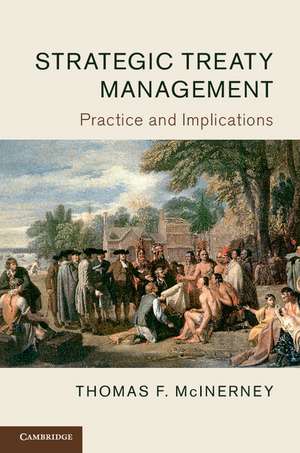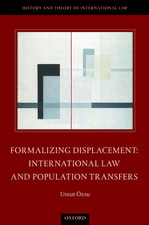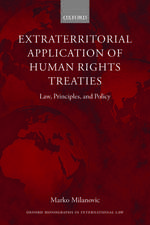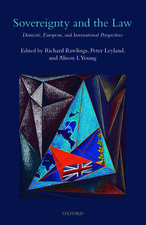Strategic Treaty Management: Practice and Implications
Autor Thomas F. McInerneyen Limba Engleză Hardback – 29 apr 2015
Preț: 783.81 lei
Preț vechi: 911.41 lei
-14% Nou
Puncte Express: 1176
Preț estimativ în valută:
149.98€ • 157.01$ • 124.10£
149.98€ • 157.01$ • 124.10£
Carte tipărită la comandă
Livrare economică 05-19 aprilie
Preluare comenzi: 021 569.72.76
Specificații
ISBN-13: 9781107089723
ISBN-10: 1107089727
Pagini: 370
Ilustrații: 1 table
Dimensiuni: 160 x 238 x 23 mm
Greutate: 0.66 kg
Editura: Cambridge University Press
Colecția Cambridge University Press
Locul publicării:New York, United States
ISBN-10: 1107089727
Pagini: 370
Ilustrații: 1 table
Dimensiuni: 160 x 238 x 23 mm
Greutate: 0.66 kg
Editura: Cambridge University Press
Colecția Cambridge University Press
Locul publicării:New York, United States
Cuprins
1. Introduction; 2. Strategies for advancing multilateral treaties; 3. Strategic approaches to national implementation; 4. Financing multilateral treaties; 5. Synergies and partnerships; 6. Science, technology, and data; 7. Performance management; 8. Conclusion; Annex A. Table of treaty strategies; Annex B. Interviews conducted.
Recenzii
'This superb book makes a major contribution to the theory and practice of international treaty-making and implementation. Moving beyond the thin conception of treaties so common in the international relations literature, McInerney draws on management theory to broaden the conceptual frame, while providing concrete suggestions for improving treaty performance. His approach promises to reinvigorate multilateral treaties as a form of international cooperation. This book is a must-read for international law scholars and practitioners.' Tom Ginsburg, Leo Spitz Professor of International Law, University of Chicago Law School
'Treaties have proliferated to affect many different domestic regulatory domains. Yet at the same time there is cynicism about treaties. States, in the eyes of many, will renege on their treaty obligations if it is in their interests to do so. In this highly innovative book Thomas F. McInerney identifies and analyses practices of what he terms 'strategic treaty management'. Understanding these practices is central to helping state and non-state actors realize the promise of treaties they have negotiated. Written with great clarity and drawing together different disciplinary contributions, this book provides scholars and practitioners with a deep understanding of the operational life of treaties.' Peter Drahos, Australian National University, Canberra
'… the strength of the book is to invite all those who examine and analyze multilateral treaties not to neglect their form, processes and outcomes while also emphasizing the need for treaties to be managed in a strategic manner, not haphazardly.' Konstantinos D. Magliveras, Academic Council of the United Nations System (www.acuns.org)
'Treaties have proliferated to affect many different domestic regulatory domains. Yet at the same time there is cynicism about treaties. States, in the eyes of many, will renege on their treaty obligations if it is in their interests to do so. In this highly innovative book Thomas F. McInerney identifies and analyses practices of what he terms 'strategic treaty management'. Understanding these practices is central to helping state and non-state actors realize the promise of treaties they have negotiated. Written with great clarity and drawing together different disciplinary contributions, this book provides scholars and practitioners with a deep understanding of the operational life of treaties.' Peter Drahos, Australian National University, Canberra
'… the strength of the book is to invite all those who examine and analyze multilateral treaties not to neglect their form, processes and outcomes while also emphasizing the need for treaties to be managed in a strategic manner, not haphazardly.' Konstantinos D. Magliveras, Academic Council of the United Nations System (www.acuns.org)
Notă biografică
Descriere
How can strategic treaty management complement legal compliance mechanisms to drive more effective and responsive treaties within global governance networks?
















